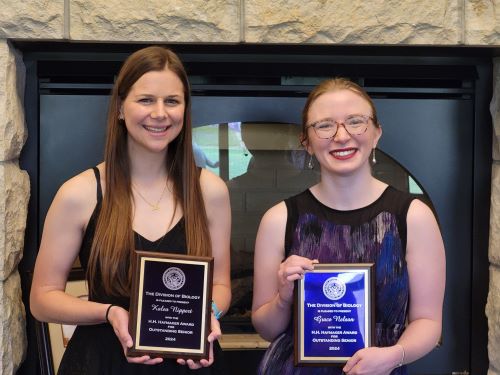May 10, 2024
Biology presents Haymaker Award to outstanding seniors

The faculty members of the Division of Biology recently awarded Grace Nelson, senior in biology with an emphasis in human health biology, Olathe, and Kalea Nippert, senior in environmental sciences and in biology with an emphasis in environmental and evolutionary biology, Wamego, with this year's H.H. Haymaker Award for Excellence.
Nelson and Nippert each joined the Division of Biology in 2020 and will be graduating on May 11. Both are highly capable and accomplished students who have excelled both academically and in research.
The Haymaker Award is the highest honor bestowed upon a biology student at Kansas State University by the Division of Biology. The award was named in honor of Herbert Henley Haymaker, a K-State alumnus, Bachelor of Science in agronomy graduate, and faculty member from 1917-1963. The award is given annually to one or two of more than 100 eligible seniors majoring in biology, fisheries, wildlife, conservation, and environmental biology, or microbiology, who have both an extraordinary level of accomplishment as an undergraduate and the promise to continue such quality performance in a biological sciences-related career. Nomination and selection criteria include grades, rigor of academic program, extracurricular activities, recommendations by faculty and performance in an interview. This year, eight seniors were nominated.
Nelson joined the neuroscience laboratory of Kimberly Kirkpatrick at the start of her sophomore year and that of Bethany Plakke in the spring of her junior year. Both laboratories are in the psychological sciences department. Nelson's current work with Plakke is aimed at understanding the behavioral changes and neurological mechanisms of autism spectrum disorder and Fragile X syndrome. In addition to Nelson's research experience at K-State, she had a summer research experience in neuropharmacology at Louisiana State University. In the laboratory, Nelson has proven herself to be a quick learner and keen thinker.
Nelson's research successes and potential have been recognized by awards and opportunities to share her work. She received an undergraduate research award from the College of Arts and Sciences, the Division of Biology's Most Promising Student Award, and a university scholar award. Nelson has presented her work on four occasions, including at a national meeting of the American Society for Pharmacology and Experimental Therapeutics.
Nelson served for two years as a residential learning assistant for a CAT Community of pre-medical students. Nelson excelled at helping her students study for biology exams, organizing review sessions and mentoring the students during their first year on campus. Her remarkable organizational skills made it possible for her to serve in the residential learning assistant role, excel in her classes and conduct research.
Nelson demonstrates high motivation, commitment and intelligence. She is considerate and maintains a positive attitude. Next, Nelson will pursue a master's degree in neurobiology at Northwestern University.
Nippert began research as a high school student, initially studying embryology with Michael Veeman. Throughout her time at K-State, she has worked with the Konza Prairie Long-Term Ecological Research program for three years as a research technician and for the last year managing the biogeochemistry laboratory. For the past two years, she has also conducted research with Zak Ratajczak's group, studying the effects of fire intensity of woody encroachment. She has also contributed to projects that involve a variety of skills, including soil and DNA analysis and programming. In addition to Nippert's research at K-State, she spent a summer studying high desert plants in Oregon and contributed to an ecology research project in South Africa. Nippert's mentors describe her as a strong, smart and reliable worker with outstanding writing ability.
Nippert has presented her work in venues that include the state capitol and a national meeting of the Ecological Society of America. She has been a university scholar, a recipient of the Robert K. Nabours and the Alan and Carolyn Harms scholarships, a recipient of the Division of Biology's Most Promising Student Award, and a nominee for the Udall and Goldwater scholarships.
Nippert has been very involved in community and leadership activities. She served as a volunteer and presenter at the Kansas Science Festival, as a volunteer in the bison roundup and prescribed burning events at Konza prairie, and as a volunteer for Students for Environmental Action and for Earth Day events. She served as a mentor for freshmen in the Division of Biology. Nippert also was a co-founder of the Kansas State University Ecology Club in 2022, serving as the club's first president and currently in an advisory role to the club.
Nippert is a flexible problem solver with a wide range of skills acquired through her diverse and extensive research experiences. Nippert plans to pursue a doctorate in environmental health science at the University of North Carolina-Greensboro, where she will study the effects of extreme drought, fire and herbivory on plant communities, as well as woody plant encroachment in savanna systems in South Africa.
